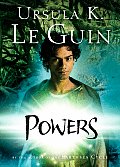
| Series: | Western Shore #3 |
| Publisher: | Graphia |
| Copyright: | 2007 |
| ISBN: | 0-15-206674-8 |
| Format: | Trade paperback |
| Pages: | 502 |
Powers is the third book in the Annals of the Western Shore, but more than the previous two books it can be read alone. The connection with the previous books is tenuous until the very end of the book, and while having read Gifts and Voices will give the ending more punch, it's not necessary.
Like the previous books in the series, Powers is told from the first-person perspective of an adolescent narrator. Gavir is a slave in the City States — a house slave, meaning that he serves in the home of his owners in town rather than working in the fields. He was born to that life and knows no other, and is content and even happy with it through the first part of the book. He's being trained as a teacher, to eventually teach other slave children and the children of the family. The family that owns him is relatively enlightened and kind, teaching all the house slaves to read and write and taking the role of benevolent guides rather than harsh masters.
Le Guin strikes a careful balance through the first portion of the book. Gavir is truly happy and content with his life, but his life is badly distorted and twisted by the mechanisms of organized slavery that he takes for granted. The reader recognizes the damage caused by always separating mothers and children, denying slaves any idea of ancestry or family apart from the rare siblings sold together (as were Gavir and his sister), and the strict codes of silence in which certain types of bullying have no remedy other than indirect support by other slaves. The opening of Powers is set in the very best of slavery, and narrated by a fairly privileged slave within that structure, which makes the point of the horrible damage it causes in a more subtle and effective way than a horror show.
One of the problems with this system is that the benevolence is unstable in ways that Gavir cannot imagine, and the trust that underlies his happiness is dangerous. When Powers takes a sharp twist, Gavir is cast adrift, left with his eidetic memory and his unreliable ability to forsee the future in a world with which he has little experience. Le Guin moves from classic coming-of-age discovery through powerful emotional characterization and into Gavir's search for his personal identity, continuing the exploration of themes of slavery with Le Guin's normally excellent, deep, and thoughtful characterization. Powers is full of memorable supporting characters, vivid, multi-faceted, and flawed, and refreshingly free of characters making obviously stupid decisions.
For most of Powers, it was a good book, but not quite on the level of Voices. I liked Gavir, but he didn't grab my attention and sympathy at the level of Memer, probably in part because the narrative opinion and the reader's opinion are so different through the first part of the book. I was sympathetic towards Gavir and understood why he felt what he did, but it still creates a bit of difference.
The ending of Powers, however, is simply spectacular. Once Gavir completes his process of personal growth, he's become a character I liked and admired a great deal, and the connection Le Guin gives him for the last segment of the book lets his best traits shine. The final chapter is just marvelous, emotionally powerful enough to make me cry and tying this book back to the previous books in the series in a deeply satisfying way.
This is a wonderful series, proof that Le Guin, now entering her ninth decade, has only gotten stronger as a writer. Powers is the final book in the series to date, and a satisfying conclusion, but should Le Guin decide to write more in this world, I would immediately buy it. Strongly recommended.
Reviewed: 2009-11-05